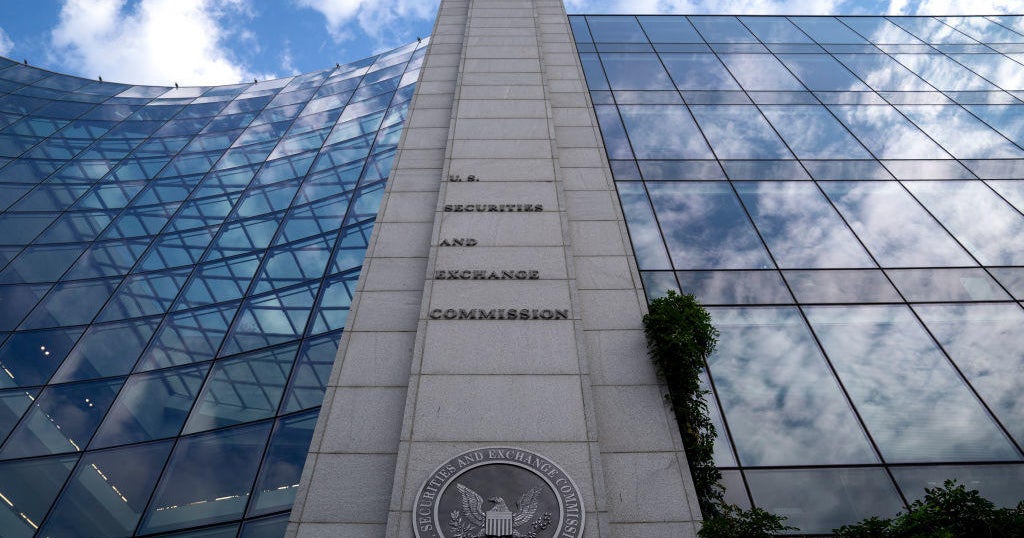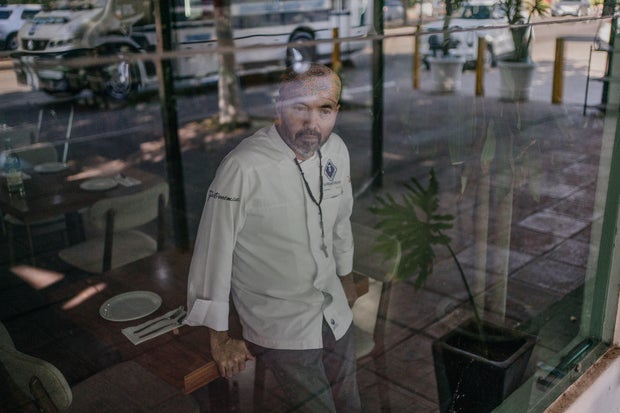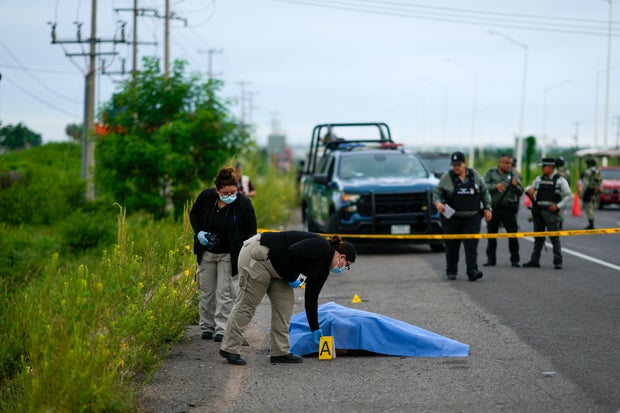CBS News
Hundreds dead in Mexican city since cartel leaders’ September arrest in U.S.: “Scared out of our wits”

An eerie silence pervades the historic center of Culiacan, capital of the Mexican state of Sinaloa, where infighting among one of the world’s biggest drug cartels has left hundreds of people dead since September.
As night falls on Paseo del Angel, the city’s entertainment quarter, a popular restaurant offering Japanese-Mexican fusion cuisine that was booked out nightly just a few months ago is virtually empty.
A nail salon and a pastry shop on the same street have “for sale” signs in the window.
“Life in Culiacan has almost disappeared,” Miguel Taniyama, owner of the Clan Taniyama restaurant, lamented.
Luis Antonio Rojas for The Washington Post via Getty Images
Years of relative quiet in Sinaloa, a predominantly agricultural state home to the notorious cartel of the same name, were shattered in September when two rival factions of the drug gang went to war.
Since then, each week has brought a grim litany of shootouts, abductions, bodies dumped in the street and vehicles and businesses set alight, sending Culiacan’s 800,000 residents scrambling for cover.
The bloodletting began on September 9 after details emerged of how the son of the cartel’s jailed founder Joaquin “El Chapo” Guzman reportedly double-crossed the cartel’s other co-founder, Ismael “El Mayo” Zambada.
Zambada was arrested on U.S. soil on July 25 after allegedly being kidnapped in Mexico and delivered to U.S. authorities against his will.
Zambada claimed he was ambushed by Joaquin Guzman Lopez, one of “El Chapol”‘s sons, who he said lured him onto a plane that was headed for the United States, where “El Chapo” himself is serving a life sentence.
The ensuing war between the cartel’s “Mayos” and “Chapitos” has left more than 400 people dead and hundreds missing, according to the state prosecutor’s office. According to an indictment by the U.S. Justice Department, the Chapitos and their cartel associates have used corkscrews, electrocution and hot chiles to torture their rivals while some of their victims were “fed dead or alive to tigers.”
The local Noroeste newspaper said 519 people had been killed in an explosion of violence that shows no signs of abating. Bodies have appeared across the city, often left slung out on the streets or in cars with either sombreros on their heads or pizza slices or boxes pegged onto them with knives. The pizzas and sombreros have become informal symbols for the warring cartel factions, underscoring the brutality of their warfare.
Eduardo Verdugo / AP
At least 10 people were killed on Monday, the state prosecutor’s office said.
Last week, five bodies were found outside the Autonomous University of Sinaloa, which promptly suspended classes and switched to remote learning.
Cartel’s stranglehold on Culiacan
The Sinaloa Cartel, one of Mexico’s biggest drug trafficking organizations, was built on cocaine smuggling but over the past decade has changed focus to feeding the U.S. opioid addiction.
The U.S. Drug Enforcement Administration in June said the gang was “largely responsible for the massive influx of fentanyl” into the country over the past eight years.
CEPROPIE via AP File
The cartel’s stranglehold on Culiacan was evident in 2019, when Mexico’s security forces attempted to arrest another of El Chapo’s sons, Ovidio Guzman Lopez.
The operation ended in humiliation for the government, which was forced to free the drug lord after the cartel launched a massive assault on the city.
While Culiacan recovered quickly from that episode — and Ovidio was later recaptured — the succession war now raging within the cartel has brought the local economy to the brink of collapse.
At least 30,000 people have lost their jobs, representing about a third of all social welfare recipients, according to the city’s chamber of commerce.
The violence has affected all aspects of daily life.
With many people fearing going out into the street, some companies have reinstated pandemic-era remote working.
The second-division Dorados de Sinaloa football club, which had late Argentine legend Diego Maradona for a coach in 2018-2019, has temporarily relocated from Culiacan to Tijuana, some 1,500 kilometers away.
“I want my son back”
Around 11,000 soldiers backed with armored vehicles and planes have been deployed to Culiacan to try to quell the violence.
In October, the army said it had killed 19 suspected cartel members and arrested one local leader in its bloodiest clashes with narco-traffickers in years.
More than 450,000 people have been murdered in Mexico since the state launched a war on drugs in 2006.
Over 100,000 people are missing.
To try lure people back onto the streets, Taniyama, the chef, organized a giant festival on November 21, with live music and lashings of Sinaloa’s signature dish, aguachile, a shrimp ceviche.
“We’ve been locked up for 70 days and scared out of our wits…Today we’re starting to live again!” he told the gathering.
But there was no respite from the suffering for the families of those caught up in the violence.
Rosa Lidia Felix, 56, has not heard from her 28-year-old son Jose Tomas since he went missing on November 1.
“Please, I want my son back,” she wept.
CBS News
Bitcoin price reaches $100,000-mark for first time ever

Bitcoin has topped the $100,000 mark as a massive rally in the world’s most popular cryptocurrency sparked by the election of Donald Trump rolls on.
The milestone comes just hours after the president-elect signaled a lighter regulatory approach to the crypto industry with his choice of Paul Atkins to be the next chair the Securities and Exchange Commission.
Trump said Wednesday that he intends to nominate Atkins, a former SEC commissioner during the presidency of George W. Bush. In the years since leaving the agency, Atkins has made the case against too much market regulation.
Bitcoin has soared to unprecedented heights since Trump won the election Nov. 5. The cryptocurrency has climbed dramatically from $69,374 on Election Day and rose as high as $101,512 Wednesday, just two years after dropping below $17,000 following the collapse of crypto exchange FTX.
How long bitcoin will stay above the coveted $100,000 mark is uncertain. As with everything in the volatile cryptoverse, the future is impossible to predict. And while some are bullish on future gains, other experts continue to warn of investment risks.
Current SEC chair Gary Gensler, appointed by President Biden, has been aggressive in his oversight of the crypto industry. Speaking at the Bitcoin 2024 conference in July, Trump vowed to fire Gensler if elected, prompting a standing ovation. Gensler has since said he will step down Jan. 20 when Trump takes office, even though his five-year term runs through 2026.
CBS News
Trump to nominate Paul Atkins, a cryptocurrency advocate, for SEC chair

President-elect Donald Trump announced Wednesday that he intends to nominate cryptocurrency advocate Paul Atkins to chair the Securities and Exchange Commission.
Trump said Atkins, the CEO of Patomak Partners and a former SEC commissioner, was a “proven leader for common sense regulations.” In the years since leaving the SEC, Atkins has made the case against too much market regulation.
“He believes in the promise of robust, innovative capital markets that are responsive to the needs of Investors, & that provide capital to make our Economy the best in the World. He also recognizes that digital assets & other innovations are crucial to Making America Greater than Ever Before,” Trump wrote on Truth Social.
The commission oversees U.S. securities markets and investments and is currently led by Gary Gensler, who has been leading the U.S. government’s crackdown on the crypto industry. Gensler, who was nominated by President Joe Biden, announced last month that he would be stepping down from his post on the day that Trump is inaugurated — Jan. 20, 2025.
Trump, once a crypto skeptic, had pledged to make the U.S. “the crypto capital of the planet” and create a “strategic reserve” of bitcoin. Money has poured into crypto assets since he won. Bitcoin, the largest cryptocurrency, is now above $95,000. And shares in crypto platform Coinbase have surged more than 70% since the election.
Paul Grewal, chief legal officer of Coinbase, congratulated Atkins in a post on X.
“We appreciate his commitment to balance in regulating U.S. securities markets and look forward to his fresh leadership at (the SEC),” Grewal wrote. “It’s sorely needed and cannot come a day too soon.”
Congressman Brad Sherman, a California Democrat and a senior member of the House Financial Services Committee, said he worries Atkins would not sufficiently regulate cryptocurrencies as SEC chair.
“He’d probably take the position that no cryptocurrency is a security, and hence no exchange that deals with crypto is a securities exchange,” Sherman said. “The opportunity to defraud investors would be there in a very significant way.”
Atkins began his career as a lawyer and has a long history working in the financial markets sector, both in government and private practice. In the 1990s, he worked on the staffs of two former SEC chairmen, Richard C. Breeden and Arthur Levitt.
His work as an SEC commissioner started in 2002, a time when the fallout from corporate scandals at Enron and WorldCom had turned up the heat on Wall Street and its government regulators.
Atkins was widely considered the most conservative member of the SEC during his tenure at the agency and was known to have a strong free-market bent. As a commissioner, he called for greater transparency in and analysis of the costs and benefits of new SEC rules.
He also emphasized investor education and increased enforcement efforts against those who steal from investors over the internet, manipulate markets, engage in Ponzi schemes and other types of fraud.
At the same time, Atkins objected to stiff penalties imposed on companies accused of fraudulent conduct, contending that they did not deter crime. He caused a stir in the summer of 2006 when he said the practice of granting stock options to executives before the disclosure of news that was certain to increase the share price did not constitute insider trading.
U.S. Rep. Patrick McHenry, a North Carolina Republican and chairman of the House Financial Services Committee, said Atkins has the experience needed to “restore faith in the SEC.”
“I’m confident his leadership will lead to clarity for the digital asset ecosystem and ensure U.S. capital markets remain the envy of the world,” McHenry posted on X.
Atkins already has some experience working for Trump. During Trump’s first term, Atkins was a member of the President’s Strategic and Policy Forum, an advisory group of more than a dozen CEOs and business leaders who offered input on how to create jobs and speed economic growth.
In 2017, Atkins joined the Token Alliance, a cryptocurrency advocacy organization.
Crypto industry players welcomed Trump’s victory in the hopes that he would push through legislative and regulatory changes that they’ve long lobbied for.
Trump himself has launched World Liberty Financial, a new venture with family members to trade cryptocurrencies.
CBS News
12/4: The Daily Report – CBS News

Watch CBS News
Be the first to know
Get browser notifications for breaking news, live events, and exclusive reporting.










